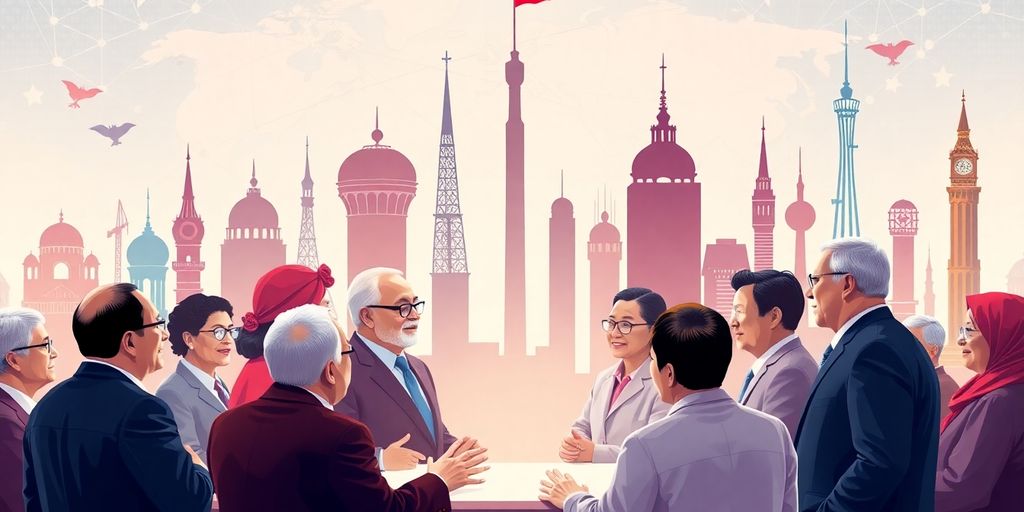Exploring John Mearsheimer on Realism: Insights and Implications

This article dives into the ideas of John Mearsheimer, a key figure in the study of international relations, particularly focusing on his views about realism. Mearsheimer’s work has sparked significant discussions and debates, making him a prominent voice in the field. His theory, known as offensive realism, offers a unique perspective on how countries interact in a world where no central authority exists. This exploration aims to unpack his contributions and the implications of his theories for understanding global politics.
Key Takeaways
- John Mearsheimer is a major thinker in realism, emphasizing the anarchic nature of international relations.
- His theory of offensive realism suggests that states are driven to seek power and dominance.
- Mearsheimer critiques other theories, arguing that they often fail to explain aggressive state behavior.
- His insights help us understand modern issues like the rise of China and NATO’s actions.
- Mearsheimer’s work remains relevant in discussions about global power dynamics and foreign policy.
Understanding the Core Principles of Realism
Realism is a key theory in international relations that focuses on the idea that states prioritize their own survival and power. This theory is built on several core principles:
The Anarchic Nature of the International System
In realism, the international system is seen as anarchic, meaning there is no central authority to enforce rules. This leads to a competitive environment where states must rely on themselves for security.
The Role of State Power in Realism
Power is central to realism. States seek to accumulate power to protect themselves and ensure their survival. This often leads to conflicts as states try to prevent others from gaining power.
Security Dilemma and Its Consequences
The security dilemma arises when one state’s efforts to enhance its security cause insecurity in others. This can lead to an arms race or conflict, as states react to perceived threats.
Realism teaches us that in a world without a governing authority, states must act in their own interest to survive.
In summary, realism emphasizes the importance of power and security in international relations, highlighting the challenges states face in an anarchic world. Understanding these principles is crucial for analyzing global politics today.
John Mearsheimer’s Contributions to Realist Theory
Offensive Realism Explained
John Mearsheimer is known for his theory of offensive realism, which builds on the ideas of earlier realist thinkers. He argues that states are always looking to gain more power because the international system is anarchic. This means there is no higher authority to keep peace among nations. Mearsheimer believes that this leads to aggressive behavior among states, as they try to ensure their own security and dominance.
Critiques and Counterarguments
Mearsheimer’s ideas have sparked many debates. Some critics argue that his focus on power and aggression overlooks other important factors in international relations. For example:
- Economic ties between countries can promote peace.
- International organizations can help manage conflicts.
- Cultural exchanges can reduce tensions.
Despite these critiques, Mearsheimer’s work remains influential in understanding global politics.
Influence on Contemporary Foreign Policy
Mearsheimer’s theories have had a significant impact on how countries approach foreign policy today. His ideas suggest that:
- Nations should be cautious about expanding their influence.
- Alliances can be both beneficial and risky.
- Understanding the motivations of other states is crucial for effective diplomacy.
Mearsheimer’s work challenges us to think critically about the nature of power and its role in international relations. His insights help explain why states act the way they do in a competitive world.
Case Studies in Mearsheimer’s Realism
The Rise of China and Its Implications
The rise of China is a significant event in international relations. Mearsheimer argues that this rise will lead to increased tensions in the Asia-Pacific region. As China grows stronger, it may challenge the United States and its allies. This situation can lead to a security dilemma where both sides feel threatened, potentially resulting in conflict.
NATO Expansion and Russian Relations
NATO’s expansion has been a controversial topic. Mearsheimer believes that this expansion has provoked Russia, leading to a more aggressive stance from Moscow. The following points summarize the implications of NATO’s actions:
- Increased military presence near Russian borders.
- Heightened tensions between NATO and Russia.
- Potential for military confrontations in Eastern Europe.
Middle East Conflicts Through a Realist Lens
Mearsheimer’s views on the Middle East highlight the importance of power dynamics. He suggests that conflicts in this region often stem from the struggle for dominance. Key factors include:
- The role of state power in shaping alliances.
- The impact of external interventions by great powers.
- The ongoing competition for resources and influence.
Mearsheimer’s analysis shows that understanding these conflicts requires a focus on the underlying power struggles rather than just ideological differences.
In summary, Mearsheimer’s realist perspective provides valuable insights into current global issues, emphasizing the importance of state power and the anarchic nature of international relations.
Realism in the Context of Globalization

Challenges to Realism in a Globalized World
In today’s interconnected world, realism faces several challenges:
- Global cooperation: Countries often work together on issues like climate change and trade.
- Non-state actors: Groups like multinational corporations and terrorist organizations play significant roles.
- Technological advancements: The rise of cyber warfare and digital diplomacy changes traditional power dynamics.
Economic Interdependence and Realist Thought
Despite these challenges, economic interdependence can be viewed through a realist lens:
- States still prioritize their own interests.
- Economic ties can lead to competition and conflict.
- Realists argue that states will act to protect their power, even in a globalized economy.
Realism’s Relevance in Modern Geopolitics
Realism remains a vital framework for understanding international relations today. It helps explain:
- The actions of great powers like the U.S. and China.
- Ongoing conflicts in regions like the Middle East.
- The balance of power in a multipolar world.
In a world where states are constantly vying for power, realism provides a clear lens to analyze their actions and motivations. Understanding these dynamics is crucial for policymakers and scholars alike.
Criticisms and Debates Surrounding Realism
Moral and Ethical Considerations
Realism often faces criticism for its perceived lack of moral and ethical guidance in international relations. Critics argue that realism prioritizes power over principles, leading to decisions that may harm global stability. This focus on power can result in actions that disregard human rights and ethical standards. Some key points of concern include:
- The justification of aggressive military actions.
- The neglect of humanitarian issues in foreign policy.
- The potential for fostering conflict rather than cooperation.
Realism vs. Liberalism
The debate between realism and liberalism is a central theme in international relations. While realism emphasizes power and state interests, liberalism advocates for cooperation and international institutions. The differences can be summarized as follows:
- Realism: Focuses on state power and survival in an anarchic world.
- Liberalism: Emphasizes cooperation, democracy, and international law.
- Critics of Realism: Argue that it fails to account for the role of international organizations and norms.
The Future of Realist Theory
As global dynamics evolve, the relevance of realism is questioned. Some scholars suggest that realism must adapt to address new challenges, such as:
- The rise of non-state actors.
- Globalization and economic interdependence.
- Environmental issues that transcend national borders.
In the face of changing global realities, realism must evolve to remain a relevant framework for understanding international relations.
In summary, while realism provides valuable insights into power dynamics, it is essential to consider its limitations and the ongoing debates surrounding its application in modern geopolitics. The theory’s offensive realism perspective, while influential, continues to be a topic of significant discussion and critique.
Implications of Realism for International Relations

Policy Formulation and Realist Influence
Realism significantly shapes how countries create their foreign policies. States prioritize their own survival and power, which leads to several key implications:
- Focus on National Interest: Countries often act in ways that protect their own interests, even if it means conflict.
- Power Dynamics: Nations constantly assess their power relative to others, influencing their decisions.
- Realpolitik: This approach emphasizes practical and strategic considerations over moral or ideological ones.
Realism’s Impact on Diplomatic Strategies
Realism also affects how countries engage in diplomacy. Here are some important points:
- Negotiation from Strength: States often enter negotiations with a show of strength to gain leverage.
- Alliances and Partnerships: Countries form alliances based on mutual interests rather than shared values.
- Crisis Management: Realist strategies focus on managing crises to maintain stability and power.
Balancing Power in a Multipolar World
In today’s world, where multiple powers exist, balancing power is crucial. This involves:
- Counterbalancing: Nations may form coalitions to counteract a rising power.
- Strategic Alliances: Countries align with others to enhance their security and influence.
- Military Preparedness: States invest in their military capabilities to deter potential threats.
Understanding realism helps us see that the international system is competitive. States must navigate this landscape carefully to ensure their survival and interests.
Conclusion
In summary, John Mearsheimer’s ideas add significant value to the understanding of international relations. His theory of offensive realism helps explain why countries often act aggressively, which is something traditional views struggle to clarify. Mearsheimer’s work not only builds on Kenneth Waltz’s theories but also introduces new thoughts on how power and geography influence global politics. While there are some issues with his theory, it still offers a clearer picture of state behavior in the chaotic world we live in. Overall, Mearsheimer’s contributions are crucial for anyone looking to grasp the complexities of international relations today.
Frequently Asked Questions
What is realism in international relations?
Realism is a theory that says countries act mainly in their own interests and focus on power and security.
Who is John Mearsheimer?
John Mearsheimer is a well-known scholar in international relations, famous for his ideas about realism, especially offensive realism.
What does offensive realism mean?
Offensive realism is the idea that countries will always try to gain more power and influence to protect themselves.
How does Mearsheimer view international conflict?
Mearsheimer believes that conflicts between countries are normal because they all want to be the most powerful.
What are some criticisms of Mearsheimer’s theories?
Some people argue that Mearsheimer’s views are too focused on power and do not consider other important factors like cooperation.
Why is Mearsheimer’s work important today?
His ideas help us understand current global issues, like the rise of China and tensions between countries.








Responses